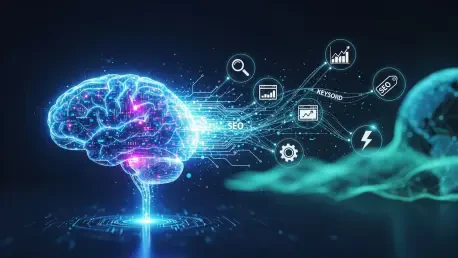Imagine a digital marketing landscape where search engine rankings are determined not just by keywords, but by an intricate understanding of user intent, powered by algorithms that learn and adapt in real-time. This is the reality of 2025, where artificial intelligence (AI) has become a cornerstone of search engine optimization (SEO), revolutionizing how businesses achieve online visibility. The integration of AI into SEO strategies marks a pivotal shift, offering unprecedented precision in content creation and search performance. This review delves into the transformative power of AI-driven SEO, exploring its core components, recent advancements, real-world applications, and the challenges it presents, while looking ahead to its potential to reshape digital marketing.
Understanding AI in SEO – A New Era of Digital Marketing
The concept of AI-driven SEO represents a fundamental change in how search engines and marketers operate. Artificial intelligence is now deeply embedded in search algorithms, content optimization processes, and marketing tools, enabling a level of sophistication that traditional methods cannot match. By leveraging machine learning and natural language processing, AI analyzes vast datasets to uncover patterns in user behavior, refine content relevance, and enhance search accuracy. This technology allows for a more nuanced approach to SEO, moving beyond static keyword placement to dynamic, intent-based optimization.
This shift occurs within a broader context of technological advancement and evolving user expectations. As internet users demand more personalized and relevant search results, search engines have turned to AI to meet these needs, prioritizing quality over quantity in content. Marketers, in turn, must adapt to these changes, using AI not just as a tool but as a strategic partner in navigating the complexities of digital visibility. The emergence of AI in SEO signifies a new era where data-driven insights and automation are essential for staying competitive in an ever-changing online environment.
Core Components of AI-Driven SEO Strategies
AI-Powered SEO Tools and Automation
A critical element of AI-driven SEO lies in specialized tools that automate and optimize various aspects of the process. Platforms such as SurferSEO, MarketMuse, and Frase have gained prominence for their ability to simplify tasks like keyword research, content structuring, and identifying content gaps. These tools use AI to analyze competitor data and suggest actionable improvements, enabling marketers to craft content that aligns with search engine priorities efficiently.
The significance of these tools extends beyond mere convenience; they bring a level of precision that manual efforts struggle to achieve. By processing large volumes of data in seconds, AI-powered platforms help marketers focus on high-impact strategies rather than getting bogged down in repetitive tasks. This efficiency translates into faster campaign execution and better resource allocation, making such tools indispensable for businesses aiming to maintain a strong online presence.
Machine Learning in SEO – Predictive and Adaptive Insights
Machine learning, a subset of AI, plays a pivotal role in modern SEO by offering predictive analytics and adaptive capabilities. This technology enables systems to learn from historical data and anticipate future search trends, providing marketers with insights into potential ranking factors before they become mainstream. Such foresight allows for proactive adjustments to content and strategy, ensuring sustained relevance in search results.
Beyond prediction, machine learning facilitates real-time adaptation to user behavior and algorithm updates. As search patterns shift, these systems dynamically refine optimization tactics, ensuring content remains aligned with current demands. This adaptability is crucial in a landscape where staying ahead of competitors often hinges on the ability to respond swiftly to emerging patterns, solidifying machine learning as a cornerstone of effective SEO.
Recent Advancements in AI and SEO Integration
The landscape of AI and SEO continues to evolve with significant updates that redefine best practices. Google’s Gemini updates, for instance, emphasize user intent and content quality, marking a departure from outdated tactics like keyword stuffing. These advancements push marketers to prioritize meaningful, value-driven content that resonates with audiences over manipulative strategies that once dominated the field.
Emerging trends also point to a growing reliance on AI for personalized search experiences. Algorithms now tailor results based on individual user data, creating a more customized interaction with search engines. Additionally, frequent algorithm updates driven by AI compel marketers to stay agile, continuously refining their approaches to align with the latest standards and maintain visibility in an increasingly sophisticated digital space.
A notable development is the seamless integration of AI into content recommendation systems, which further enhances user engagement. By understanding nuanced preferences, these systems suggest content that keeps users on platforms longer, indirectly boosting SEO metrics. This trend underscores how AI is not just a tool for optimization but a driver of holistic improvements in digital marketing efficacy.
Real-World Applications of AI in SEO
Across various industries, AI-driven SEO strategies are being implemented with remarkable results. In e-commerce, for example, AI tools optimize product descriptions and search filters to match customer queries more effectively, driving higher conversion rates. Large retailers use these technologies to analyze consumer trends and tailor their online presence, ensuring they meet market demands with precision.
In content publishing, AI facilitates scalability by generating articles, summaries, and metadata at an unprecedented pace. This capability allows media outlets to cover diverse topics while maintaining SEO relevance, reaching wider audiences without sacrificing quality. Meanwhile, digital advertising benefits from AI’s ability to refine ad targeting through search data, ensuring campaigns resonate with the right demographics.
Small businesses also leverage AI for automated optimization, leveling the playing field against larger competitors. By using affordable AI tools, these entities can enhance their websites’ visibility without extensive resources, focusing on local search optimization or niche markets. Such varied applications highlight AI’s versatility in addressing unique needs across the digital spectrum.
Challenges and Limitations of AI-Driven SEO
Despite its advantages, AI-driven SEO is not without hurdles that marketers must navigate. A primary concern is the risk of over-reliance on automation, which can result in content lacking authenticity or depth. When AI-generated material fails to capture a brand’s voice or provide genuine value, it risks alienating audiences and incurring penalties under Google’s stringent spam policies.
Technical challenges also arise, particularly in ensuring that AI outputs align with strategic goals. Without human oversight, automated systems may prioritize metrics over meaning, producing content that meets algorithmic criteria but misses emotional resonance. Striking a balance between leveraging AI’s efficiency and preserving creative input remains a persistent issue for many organizations.
Moreover, the rapid pace of AI development can overwhelm teams lacking the skills to implement these tools effectively. Keeping up with updates and integrating them into existing workflows requires continuous learning and adaptation. Addressing these limitations involves a commitment to blending automation with human judgment, ensuring that technology serves as an enabler rather than a sole decision-maker.
Future Outlook for AI in SEO
Looking ahead, the integration of AI into search algorithms is expected to deepen, with even more sophisticated systems emerging to refine ranking mechanisms. Innovations in natural language understanding could enable search engines to interpret queries with greater context, further emphasizing the need for high-quality, intent-focused content. This trajectory suggests a future where SEO becomes increasingly user-centric, driven by AI’s analytical prowess.
The evolution of machine learning in SEO also promises more precise targeting capabilities. From 2025 to 2027, advancements are likely to enhance predictive models, allowing marketers to anticipate shifts in user behavior with greater accuracy. Such developments could redefine campaign planning, making it more proactive and less reactive to external changes in the digital environment.
Long-term, AI’s impact on digital marketing may reshape the role of SEO professionals, fostering a hybrid model of human-AI collaboration. As routine tasks become fully automated, specialists can focus on strategy, creativity, and relationship-building, areas where human insight remains unmatched. This shift points to a future where adaptability and interdisciplinary skills become key to thriving in an AI-enhanced industry.
Final Thoughts on AI-Driven SEO
Reflecting on this exploration, it is evident that AI has carved a transformative path in SEO, enhancing efficiency and precision in ways previously unimaginable. The review highlighted how tools and machine learning have streamlined complex processes, while Google’s updates have pushed for a focus on user intent and quality. Real-world applications across industries have demonstrated AI’s versatility, though challenges like over-reliance and authenticity concerns underscore the need for balance.
Moving forward, the actionable step is to embrace a collaborative approach, integrating AI’s strengths with human creativity to optimize outcomes. Marketers are encouraged to invest in training to master emerging tools, ensuring they can harness AI without compromising content integrity. Additionally, staying vigilant about algorithm shifts and prioritizing audience engagement over pure automation offers a sustainable path to maintaining relevance in a rapidly evolving digital arena.









